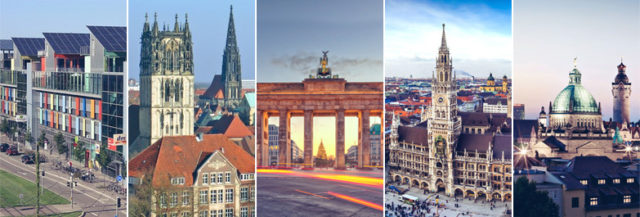Germany is one of the most popular destinations in the world for higher studies among international students. Many young aspirants from India too opt for Germany for their undergraduate, postgraduate, doctoral and postdoctoral studies. It is the third most attractive study destination for international students after the USA and the UK. In 2014, a record number of 301,350 foreign students were enrolled in German universities – a seven percent rise from the previous year. While almost half of its international student pool arrives from Europe, nearly 32 percent foreign students are from Asia.

Let us find out the topmost reasons why more and more students are choosing this mighty European nation as their ultimate study destination:
1.Quality Higher Education
Germany is known for its world-class universities covering a variety of academic profiles and offering study courses that are internationally acclaimed. Many of its technical institutes are world-renowned and academic standards top-notch. While a majority of foreign students enrol in technical or engineering courses, several other disciplines are popular too. The country also boasts of excellent research infrastructure. Universities, universities of applied sciences and non-university research institutes offer state-of-the-art infrastructure for research work to both German and foreign students. Also, Auto, Pharmaceuticals and several other industries are actively engaged in research work.
- No Tuition Fees
Higher education is state-funded, so most universities, except private institutes, charge no or negligible tuition fees. Semester contribution payment, however, remains mandatory. Also, most Masters courses incur tuition fees, but that is just a fraction of what universities charge in other countries, such as the USA and the UK. Students can also benefit from a plenty of scholarship programmes such as DAAD, Erasmus etc. Affordable quality education is one of the biggest factors luring international students to Germany. Also, cost of living in most German cities is lower compared to other prominent study destinations in Europe.
- Part-Time Job Opportunities for Students
European students enjoy same rights as German citizens regarding entry, study and work opportunities. International students not hailing from European Union (EU) countries are permitted to work for a stipulated number of hours allowing them to bear their living expenses at least partially. A non-EU student is permitted to work for 120 full days or 240 half days in a year without work permit. The student cannot work for more than 20 hours a week. Also, a non-EU student cannot go freelance or work self-employed.
- Work Opportunities After Course Completion
After graduating from a German University, foreign students not belonging to the EU countries are allowed to stay up to 18 months to seek employment. With its robust economy and market diversification, the country has a lot to offer to job seekers.
- Culture, Language, and Leisure
While a lot of universities offer programmes in English and therefore it is not mandatory for everyone to learn German to be able to study in Germany, knowing the language makes day-to-day life easier. Communication and thus integration becomes smoother when one knows the local language. Students also get the opportunity to explore various aspects of German life and culture and delve into country’s rich and complex history. Germany is very popular vacation and tourist destination as its diverse landscape offers excellent opportunities for leisure and sports activities.
- Excellent Travel Opportunities
Once in Germany with valid visa and residence permit, students hailing from non-EU nations, such as India, are able to travel freely within the Schengen zone, comprising 26 European countries. One doesn’t need to apply for a separate visa to travel to a country inside the Schengen zone. Many youngsters use this opportunity to travel the length and breadth of Europe and discover new cultures. Germany itself shares border with nine countries and its highly efficient and extensive rail network makes it easier for the travellers to visit its European neighbours.


























